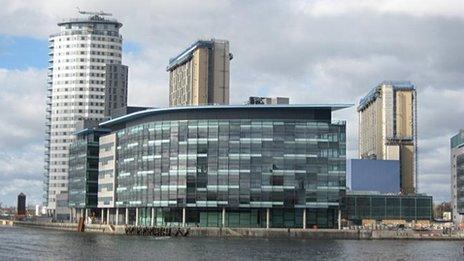大象传媒 'boosts UK economy by 拢8bn'
- Published

The 大象传媒's MediaCity HQ in Salford Quays
The 大象传媒 generated more than 拢8bn for the UK economy in 2011-12, almost twice its licence fee spend.
A published by the corporation showed licence money spending had a positive knock-on effect for regional economies.
The total expenditure over the two-year period came to 拢4.3bn, which led to a gross value-added (GVA) boost to the economy of 拢8.3bn.
However, spending in London was three times the rest of the UK combined.
The report said: "The effect of initial 大象传媒 spending is 'multiplied' as it ripples through the economy from region to region and sector to sector (and to the employees of those sectors). This is known as the 'multiplier effect'."
The 大象传媒's chief economic and policy adviser Najma Rajah explained: "The basic premise is that when the 大象传媒 spends a pound, the impact of that pound is 'multiplied' as that pound spent by the 大象传媒 creates value elsewhere in the economy.
"So, for example, if the 大象传媒 were to buy a camera from a supplier in Manchester, the camera supplier would receive some money in return for the camera.
"The camera company would then use the income generated from the sale of the camera to pay their suppliers for the components that went into the camera and to also pay their employees and so on."
Rajah added: "A really good example of how this multiplier effect works is when the 大象传媒 commissions a programme that is made by an independent television production.
"The programme might be filmed in Scotland using local runners, electricians, make-up artists etc. who are paid and then will spend their wages in Scotland to the benefit of the Scottish economy."
The report revealed significant growth in the north of England following the opening of the new 大象传媒 North headquarters in Salford Quays, with GVA growing 19.7% to 拢391m.
But in the Midlands, it fell 21.7% to 拢199m, while the south was down 18.8% to 拢699m and Wales dropped 6.2% to 拢276m.
London saw the biggest expenditure of 拢2.98bn - nearly three times as much as the rest of the UK combined - which in turn generated 拢5.65bn GVA.
John Tate, the 大象传媒's director of policy and strategy, used the findings of the report to call on Ofcom to reverse its plans for a spectrum tax on broadcasters next year.
In a blog post he wrote: "The wider benefit of the licence fee provides an extra reason for Ofcom to think again before it implements a spectrum tax next year: a levy on the spectrum broadcasters use to transmit their programmes.
"As well as hitting licence fee payers, such a tax would remove much-needed cash from the UK's creative sector."
- Published23 March 2012